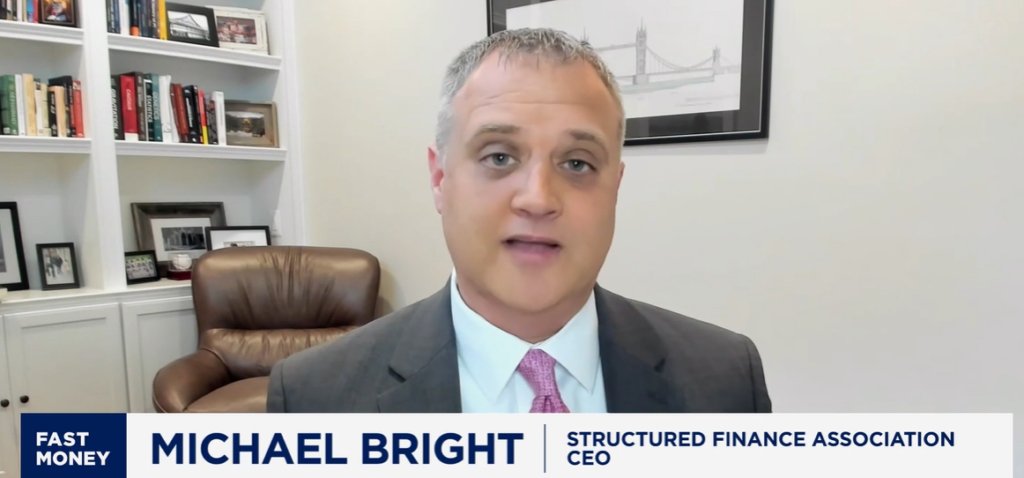With the rumor mill heating up as President Donald Trump inches closer to the privatization of Fannie Mae and Freddie Mac, Michael Bright, former COO of Ginnie Mae and current Structured Finance Association CEO, appeared on a recent episode of CNBC’s “Fast Money” to discuss the issue.
“You really want to make sure that if Fannie and Freddie are removed from conservatorship, that you keep in place some guardrails to protection to ensure that they are focused on their core mission,” explained Bright.
Fannie Mae and Freddie Mac help provide stability and affordability to America’s home mortgage market. The National Association of Realtors (NAR) reports that Fannie and Freddie support approximately 70% of the U.S. mortgage market. Government-backed mortgages are loans obtained through private lenders, but are insured by one of three federal government agencies: the Federal Housing Administration (FHA), the U.S. Department of Agriculture (USDA), or the U.S. Department of Veterans Affairs (VA).
Earlier this week, President Trump took to social media platform Truth Social, stating: “Our great Mortgage Agencies, Fannie Mae and Freddie Mac, provide a vital service to our Nation by helping hardworking Americans reach the American Dream—Home Ownership. I am working on TAKING THESE AMAZING COMPANIES PUBLIC, but I want to be clear, the U.S. Government will keep its implicit GUARANTEES, and I will stay strong in my position on overseeing them as President. These Agencies are now doing very well, and will help us to, MAKE AMERICA GREAT AGAIN!”
Before being taken into conservatorship, Fannie Mae and Freddie Mac had what was known as an “implicit guarantee”—the market’s assumption that if something went wrong, the government would intervene and save them.
Bright joined the Structured Finance Association in January 2019 as CEO, where he currently oversees the vision, strategy, convening, and advocacy work of the Structured Finance Association. Prior to joining the Structured Finance Association, Bright served as COO of Ginnie Mae, where he managed all operations for Ginnie Mae’s $2 trillion portfolio of mortgage-backed securities (MBS). Before joining Ginnie Mae, Bright was a Director at the Milken lnstitute’s Center for Financial Markets. From 2011-2014 Michael worked in the office of Sen. Bob Corker, where he advised on a range of Senate Banking Committee regulatory and legislative issues. Prior to coming to Washington, he was an interest rate derivatives trader for Wachovia’s broker-dealer in Charlotte, North Carolina. He began his career in 2002 as an analyst, modeler, and then trader, hedging MSRs at Countrywide Financial in Calabasas, California.
“All we have seen so far is a couple of posts by the President,” said Bright. “So there is an argument to be made, and reform efforts in the past have attempted to separate the government’s role in ensuring liquidity in the mortgage-backed securities from the risk taking role of private enterprises that could potentially go insolvent and undergo some sort of a resolution mechanism via a Title II Dodd-Frank type resolution, or something like the FDIC would they take a company into receivership. But in most reform plans that are comprehensive, you have a very clear backstop that the government would provide liquidity to the MBS so that the mortgage-backed securities holders are not taking on the credit risk of the underlying companies themselves. Thus far from the administration, we haven’t seen any details.”
On September 6, 2008, the Director of the Federal Housing Finance Agency (FHFA) exercised statutory authority to place Fannie Mae and Freddie Mac into conservatorship. This move, originally intended as a temporary move, established the two conservatorships in response to a deterioration in the nation’s housing market that damaged the financial condition of each, and left both of them unable to fulfill their missions without government intervention.
The Federal Housing Enterprises Financial Safety and Soundness Act of 1992 as amended by the Housing and Economic Recovery Act of 2008, authorizes the FHFA as conservator to “take such action as may be necessary to put the regulated entity in a sound and solvent condition; and appropriate to carry on the business of the regulated entity and preserve and conserve the assets and property of the regulated entity.”
Bright suggested that possible Congressional involvement could ease the transfer of Fannie and Freddie out of conservatorship.
“The best thing would be for Congress to get involved and clarify what the government’s role is going to be, and they can put congressional stamp on it,” noted Bright. “Then, investors know what they’re getting. That’s exactly what you have with Ginnie Mae. When I ran Ginnie Mae, I would go around the world and talk to central banks, and go around the country and talk to investors, and they all knew that the government’s role was very clearly defined. This is why Ginnie Mae didn’t take any losses during the financial crisis, because it was a backstop that was deep in the capital stack.”
See the full interview with Michael Bright on CNBC’s “Fast Money” below.








